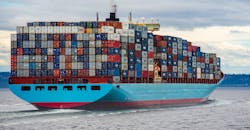With Suez Canal 'Next Time' Came Earlier Than Supply Chain Leaders Hoped
Supply chains have been hit pretty hard over the past 12+ months. First, the pandemic put a spotlight on the fragility of certain sectors, as necessities quickly became scarcities, and then the Ever Given created a massive traffic jam interrupting the flow of materials through one of the busiest international trade routes.
Unfortunately, it’s not over yet. In fact, the real wave of disruption may only be starting. The question is: How should manufacturers prepare?
While the event has ended, the disruption will continue and likely broaden, explains Jeffrey Miller, managing principal with BTV Advisors, LLC. “Indeed, in some sectors the disruption may not have begun. For some markets, commodities and products, safety stocks, transit times, and other routine supply chain cycle times may be delaying the eventual – but, certain – onset of disruptions,” he says. “Prepared supply chain and integrated risk managers across manufacturing sectors will have already activated their continuity programs and are engaging their alternate sources of supply for affected commodities, and alternate resources for outbound logistics and global transport where likely needed. Air cargo carriers across Europe are anticipating increases for schedule recovery and logistical reasons.”According to Miller, manufacturers must quickly examine multiple tiers of their upstream and downstream supply chains in search of potential material delays and shortages due to the canal disruption. “This applies equally to suppliers and customers. They’re likely reviewing demand forecasts, order books, production schedules, distribution plans and the corresponding procurement plans and purchasing schedules for possible impacts,” he says.
For the outbound side of the supply chain, manufacturers may already be feeling the effects of the global shortage of shipping containers. “The Suez event will only amplify the natural consequences of the transit delays caused the blocked canal,” says Miller. “Goods scheduled to ship even weeks from now may be affected by this perfect storm of limited global capacity, inflexible scheduling, and out-of-position logistics assets.”
The Importance of Supply Chain and Integrated Risk Management
The principal mission of supply chain management is to optimize cost and risk, which means having contingency and continuity plans for a wide range of situations, from routine disruptions to “black swan” events like the Ever Given.
“The pandemic showed us that many of our supply chains had become too lean, too brittle, and unable to flex and accommodate the disruptions of the pandemic,” says Miller. “Many supply chain leaders promised themselves, their companies, customers and communities they would be more prepared for, the next time. The Ever Given has caused that ‘next time’ to occur a lot sooner than many expected.”
Adds Miller, “Time will tell if supply chains are prepared and able to absorb the impending tsunami caused by a week’s blockage of the Suez Canal. The event will also be a significant test of digital supply chain collaboration technologies and business processes. The absence of bullwhip effects in the coming weeks will be sound confirmation of timely collaboration and transparency across supply chains.”
About the Author
Peter Fretty
Technology Editor
As a highly experienced journalist, Peter Fretty regularly covers advances in manufacturing, information technology, and software. He has written thousands of feature articles, cover stories, and white papers for an assortment of trade journals, business publications, and consumer magazines.

